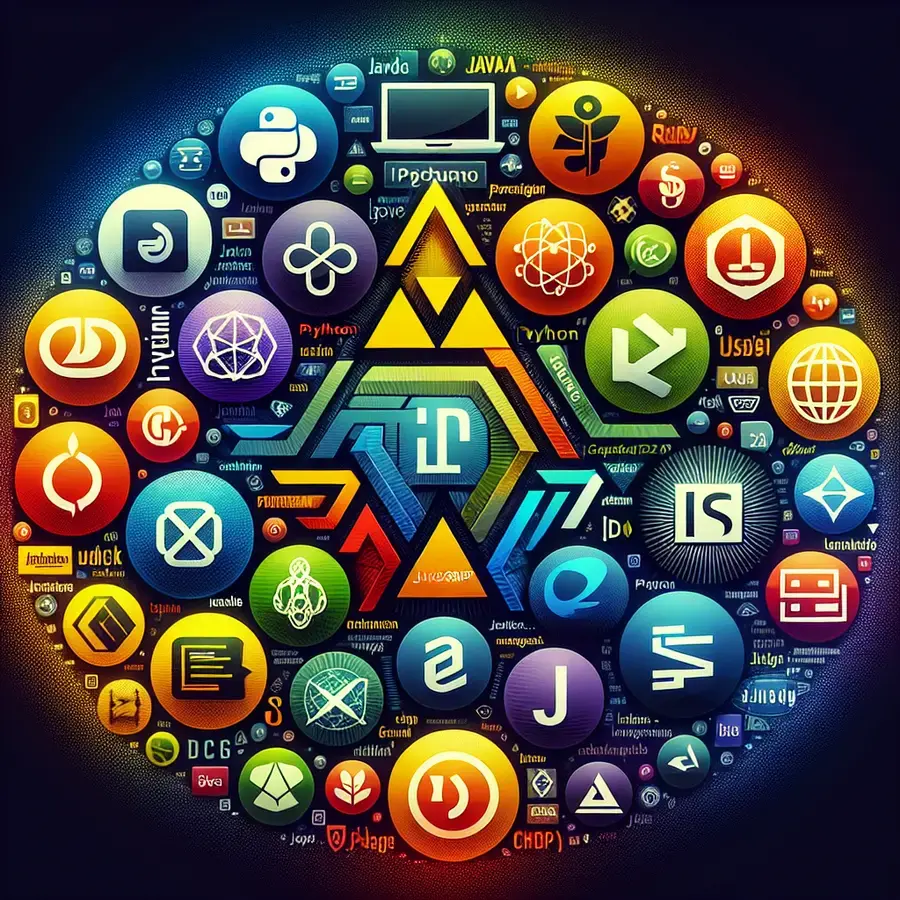Unlocking the Future of Coding: Top Programming Languages to Learn in 2025

As technology continues to evolve at a breakneck pace, the demand for skilled programmers is skyrocketing. Did you know that the global programming market is projected to grow by 21% by 2025, outpacing the average growth rate of other tech industries? With so many programming languages to choose from, it can be daunting to decide which ones to learn.
With years of experience in the tech industry and a proven track record of helping developers stay ahead of the curve, we’ll guide you through the most in-demand programming languages of 2025. In this article, we’ll explore the key trends, insights, and expert advice to help you make informed decisions about your coding career. Discover the programming languages that will give you a competitive edge in the job market and unlock new opportunities in the world of tech.
📚 Table of Contents
- The Future of Coding: Emerging Trends in Programming Languages
- Building a Strong Foundation: Essential Skills for Aspiring Developers
- A Step-by-Step Guide to Learning Your First Programming Language
- Language Showdown: Comparing Popular Choices for Beginners
- Unlocking Career Opportunities: The Most In-Demand Programming Languages
- Maximizing Your Earning Potential: The Financial Benefits of Programming Skills
- Navigating the Options: How to Choose the Right Language for Your Goals
- From Novice to Pro: Best Practices for Accelerating Your Learning Journey
- The Impact of Emerging Technologies on Programming Language Popularity
- Setting Yourself Up for Success: Preparing for a Career in Programming
- Evaluating the Trade-Offs: Performance, Security, and Ease of Use Compared
The Future of Coding: Emerging Trends in Programming Languages
The future of coding is rapidly evolving, driven by emerging trends in programming languages that prioritize efficiency, scalability, and adaptability.
One significant trend is the rise of functional programming languages, such as Haskell and Rust, which offer improved code reliability and maintainability through their immutable data structures and composable functions.
Another key trend is the growing adoption of languages that support concurrent and parallel programming, such as Go and Kotlin, which enable developers to write high-performance code that can take full advantage of modern multi-core processors.
- Languages like Julia are gaining traction for their high-performance capabilities and ease of use, making them an attractive choice for applications that require both speed and agility.
- Meanwhile, languages like Python continue to dominate the landscape, driven by their extensive libraries and frameworks that support a wide range of use cases, from data science to web development.
As the programming landscape continues to evolve, it’s likely that we’ll see even more specialized languages emerge, each tailored to specific domains and use cases.
To stay ahead of the curve, developers will need to be adaptable and willing to learn new languages and technologies, with a focus on mastering the underlying principles and concepts that drive the coding world.
Building a Strong Foundation: Essential Skills for Aspiring Developers
Aspiring developers need to start by building a strong foundation in programming fundamentals.
Mastering data structures and algorithms is crucial as it enables developers to write efficient and scalable code.
Understanding object-oriented programming (OOP) concepts is also vital, as it helps developers create reusable and maintainable code.
- Learn about classes, objects, inheritance, and polymorphism.
- Practice implementing OOP concepts in different programming languages.
Familiarity with version control systems like Git is essential for collaborative development and tracking changes.
Developing problem-solving skills through platforms like LeetCode, HackerRank, or CodeWars can significantly improve coding abilities.
Additionally, learning about databases, including data modeling and querying, is vital for most development roles.
A Step-by-Step Guide to Learning Your First Programming Language
Learning your first programming language can seem daunting, but breaking it down into manageable steps makes it achievable. Start with the basics and understand the syntax and data types of the language you’ve chosen. Familiarize yourself with the language’s environment and the tools required for coding.
The next step is to choose the right resources for learning. This could include online courses, coding boot camps, or textbooks that cater to beginners. Ensure the resources you pick are up-to-date and relevant to your chosen language.
Practice is key to learning any programming language. Start with simple projects such as calculators or quizzes to get a feel for how the language works. As you progress, move on to more complex projects that challenge you.
- Join online communities like GitHub or Stack Overflow to connect with other programmers and get help when you’re stuck.
- Participate in coding challenges to test your skills and learn from others.
- Share your projects to get feedback and understand how to improve.
Be patient and persistent; learning a programming language takes time and effort. Don’t be discouraged by setbacks or bugs – they’re an integral part of the learning process.
Finally, apply your knowledge by working on real-world projects or contributing to open-source projects. This hands-on experience will solidify your understanding and prepare you for more advanced topics.
Language Showdown: Comparing Popular Choices for Beginners
When it comes to choosing a programming language to learn, beginners are often overwhelmed by the numerous options available.
The most popular choices are often considered the best for beginners, as they have large communities and a wealth of resources available.
Some of the most popular programming languages for beginners include Python, JavaScript, and Java.
- Python is known for its simplicity and versatility, making it a great language for data science and machine learning.
- JavaScript is widely used for web development and is a great choice for those interested in front-end development.
- Java is a popular language for Android app development and is also used in enterprise software development.
Ultimately, the best language for a beginner will depend on their goals and interests.
It’s essential to choose a language that has a strong support community and a wide range of resources available, including tutorials, documentation, and forums.
By choosing a popular language, beginners can ensure they have access to the help and support they need to succeed.
Unlocking Career Opportunities: The Most In-Demand Programming Languages
The job market is constantly evolving, and the demand for certain programming skills can shift rapidly. To stay ahead of the curve, it’s essential to focus on the most in-demand programming languages that can unlock new career opportunities.
Some of the key factors driving the demand for specific programming languages include the growth of emerging technologies like AI, machine learning, and cloud computing. As a result, languages that support these technologies are becoming increasingly popular among employers.
- Python is a prime example, with its widespread adoption in data science, machine learning, and automation.
- JavaScript remains a staple in web development, with its versatility and extensive ecosystem making it a favorite among developers.
- Java continues to be a popular choice for enterprise software development, Android app development, and other large-scale applications.
Focusing on these in-demand languages can significantly enhance your career prospects, as they are widely used in various industries and are often in short supply.
By acquiring skills in these programming languages, you can position yourself for success in a rapidly changing job market and stay competitive in the industry.
Maximizing Your Earning Potential: The Financial Benefits of Programming Skills
Acquiring programming skills can significantly boost your earning potential in today’s tech-driven job market. Programmers are in high demand, and companies are willing to pay top dollar for talented individuals who can develop innovative software solutions.
One of the primary financial benefits of programming skills is the potential for higher salaries. According to industry reports, skilled programmers can earn up to 50% more than their non-technical counterparts.
In addition to higher salaries, programming skills can also open up opportunities for freelance work or starting your own business. This can lead to increased financial flexibility and the potential for unlimited earning potential.
Some of the most lucrative programming skills include:
- Proficiency in in-demand programming languages such as Python, JavaScript, or Java
- Experience with cloud computing platforms like AWS or Azure
- Knowledge of data science and machine learning techniques
By acquiring these skills, you can position yourself for success in the tech industry and maximize your earning potential.
Navigating the Options: How to Choose the Right Language for Your Goals
When it comes to selecting a programming language to learn, it’s essential to consider your goals and what you want to achieve.
Identify your motivation: Are you looking to develop mobile apps, build websites, or work with data science?
Different languages are suited for different tasks, so understanding your goals will help narrow down the options.
- For web development, consider languages like JavaScript, HTML/CSS, and PHP.
- For mobile app development, look into Java, Swift, or Kotlin.
- For data science and machine learning, Python is a popular and versatile choice.
Consider the job market: Research the languages that are in demand in your desired field or industry.
Some languages, like Python and JavaScript, are consistently in high demand across various sectors.
Ultimately, the right language for you will depend on your goals, interests, and the type of projects you want to work on.
From Novice to Pro: Best Practices for Accelerating Your Learning Journey
To accelerate your learning journey in programming, it’s essential to set clear and achievable goals. This helps you stay focused on what you want to accomplish and allows you to track your progress effectively.
One of the most effective ways to learn programming is by working on real-world projects. This hands-on experience not only deepens your understanding of the concepts but also helps you develop problem-solving skills.
Joining online communities and forums is another crucial step in your learning journey. Platforms like GitHub, Stack Overflow, and Reddit offer valuable resources, support, and networking opportunities.
- Engage with other programmers to gain insights into best practices and new technologies.
- Share your projects and experiences to receive feedback and improve.
Consistency is key when it comes to learning programming. Regular practice, even if it’s just for a short duration each day, is more effective than infrequent, long study sessions.
To further enhance your learning, explore different learning resources such as online courses, tutorials, and books. Diversifying your learning materials can help you understand complex concepts from different perspectives.
The Impact of Emerging Technologies on Programming Language Popularity
The programming landscape is constantly evolving, and emerging technologies play a significant role in shaping the popularity of programming languages.
Artificial Intelligence (AI) and Machine Learning (ML) have been driving the demand for languages like Python, R, and Julia, which are well-suited for data-intensive tasks and complex computations.
The rise of cloud computing has also influenced the popularity of programming languages, with languages like Java, Python, and Go being widely used for developing cloud-native applications.
Other emerging technologies like Blockchain and Internet of Things (IoT) are also impacting the programming language landscape, with languages like Solidity, Rust, and C++ being used for developing secure and efficient applications.
- Languages like Python and JavaScript are being used for developing AI and ML-powered IoT applications.
- Rust is gaining popularity for building secure and reliable systems, including those used in IoT and Blockchain.
As new technologies emerge, programming languages that are well-suited for these technologies are likely to gain popularity, making it essential for developers to stay up-to-date with the latest trends and technologies.
Setting Yourself Up for Success: Preparing for a Career in Programming
To succeed in a programming career, it’s essential to start by building a strong foundation in the basics of programming, including data structures, algorithms, and software design patterns.
One of the most effective ways to prepare is by practicing coding regularly through platforms like LeetCode, HackerRank, or CodeWars, which offer a wide range of challenges and exercises to help improve your skills.
Additionally, learning by doing is a crucial aspect of programming education; working on personal projects or contributing to open-source projects can help you gain hands-on experience and build a portfolio of work.
- Participate in coding challenges and hackathons to test your skills and learn from others.
- Join online communities, such as GitHub or Reddit’s r/learnprogramming, to connect with other programmers and get feedback on your work.
- Consider taking online courses or attending coding boot camps to supplement your learning and gain new skills.
By following these steps and staying committed to your goals, you can set yourself up for success in a career in programming and stay ahead of the curve in a rapidly evolving field.
Evaluating the Trade-Offs: Performance, Security, and Ease of Use Compared
When choosing a programming language to learn in 2025, it’s essential to consider the trade-offs between performance, security, and ease of use.
Performance is critical for applications that require speed and efficiency, such as gaming or high-frequency trading.
Languages like C++ and Rust are known for their performance capabilities, but they can be challenging to learn and require manual memory management.
- C++ offers low-level memory management and is widely used in systems programming.
- Rust provides memory safety features without sacrificing performance.
On the other hand, languages like Python and JavaScript prioritize ease of use and are ideal for beginners or rapid prototyping.
However, they may not be the best choices for applications that require raw performance.
Security is another crucial factor, particularly for languages used in web development or other security-sensitive areas.
- Languages like Rust and Go have built-in security features that help prevent common vulnerabilities.
- JavaScript, while popular for web development, requires additional security measures to prevent client-side attacks.
Ultimately, the best language for you will depend on your specific needs and goals.
Consider your priorities and choose a language that balances performance, security, and ease of use accordingly.


